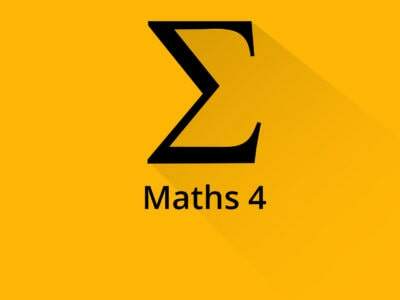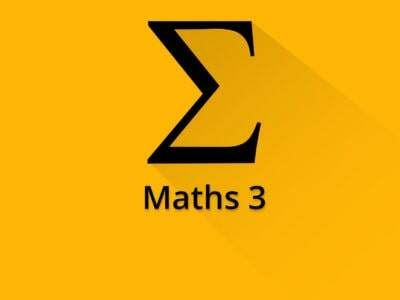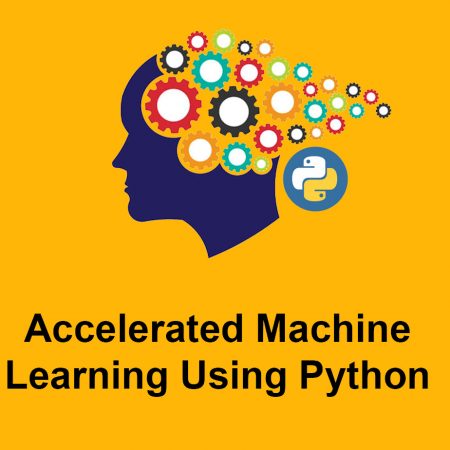Engineering Maths- 4 [All Branches] ( Videos + Handmade Notes )

-
About the Course
-
Description
This series is completely for beginners if you don't know the basics its completely fine then also you can easy learn from this series and understand the complex concept of maths 4 in a easy way
Branches Covered ( Comps , Mechanical , Civil , EXTC , Electrical , Electronics )
Handmade Notes : Notes are Brilliant , Easy Language , East to understand ( Student Feedback )
Exam ke Pehle Notes ek baar Dekhlo revision aise hi jata hai
Complex Integration
Matrices / Linear Algebra : Matrix Theory
Probability
Sampling
Mathematical Programming
Vector Calculus (Mech /Civil )
Linear Programming ( Mech /Civil )
Correlation (EXTC/Electrical/Electronics)
Coming Soon
Nonlinear Programming
Calculus of Variation
Linear Algebra : Vector space -
Complex Integration
- Complex integration along a Line or Parabola with Solved Example
- Complex integration along a Circle with Solved Example
- Cauchy’s Theorem Basics & Cauchy’s integral formula Type 1
- Cauchy’s Theorem Type 2 and Type 3
- Cauchy’s Theorem Type 4 and Type 5
- Taylor and Laurent series Full Basic with Solved Example part 1
- Taylor and Laurent series Full Basic with Solved Example part 2
-
Probability Distribution
- Introduction to Probability Distribution
- Discrete Random Variable in Probability Distribution
- Distribution function of Discrete Random Variable
- Continuous Random Variable in Probability Distribution
- Continuous Distribution Function in Probability Distribution
- Expectation in Probability Distribution
- Mean and Variance Part 1 in Probability Distribution
- Mean and Variance Part 2 in Probability Distribution
- Moments and Moments Generating Function Part #1 in Probability Distribution
- Moments and Moments Generating Function Part #2 in Probability Distribution
- Binomial Probability Distribution
- Poisson Distribution with Solved Example
- Normal Distribution Full Basic Concept
- Normal distribution with Solved Example
-
Linear Algebra / Matrices
- Introduction to Matrices
- Eigen value and Eigen vector in Matrices
- Eigen value and Eigen vectors for Types of Matrices
- Cayley Hamilton Theorem with Example Part 1
- Cayley Hamilton Theorem with Example Part 2
- Cayley Hamilton Theorem with Example Part 3
- Monic and Minimal Polynomial of a Matrix
- Algebraic multiplicity And Geometric multiplicity
- Functions of a Square Matrix in Matrices
- Reduction of Quadratic form to Canonical form
- Orthogonal Matrix with Solved Example
-
Sampling Theory
- What Is Sampling
- Large Sampling Problems
- Large Sampling Test Theory+Numerical
- Hypothesis Testing Full concept
- Testing Difference Between Means(case_1) With Examples
- Small Sample Test Example
- Small Sample Test
- Testing Difference Between Means(case_1) With Examples Part 2
- Testing Difference Between Means(case_2)
- Non Parametric Test Type_1_Numerical
- Non Parametric Test
-
Mathematical Programming / Linear Programming
-
Vector Calculus
-
Calculus of Variation
- Euler’s Differential Equation
- Functions of Second Order Derivative
- Gram Schmidt Process With Numerical
- Hypothesis Concerning Several Proportions
- Linear Combinations Of Vector
- Non Parametric Test Type_2_Numerical
- Pythagorean Theorem
- Subspaces
- Cauchy Schwarz Inequality in R^
- Lagranges Method
- Rayleigh Ritz Method
-
Correlation (EXTC, Electrical , Electronics)
-
Regression (EXTC, Electrical , Electronics)
-
Notes
- Complex Integration Notes
- Matrices Notes
- Probability Notes
- Sampling Theory Notes
- Linear Programming Problems Notes
- Calculus of Variation (EXTC, Electrical , Electronics Notes)
- Linear Algebra Vector Space (EXTC, Electrical , Electronics Notes )
- Correlation,Regression and Curve Fitting (EXTC, Electrical , Electronics Notes )
- Graph and Group theory (IT)
- Lattice theory (IT)
-
Solution Keys
-
Z transform
Want to Clear your Engineering Math’s 4 in first attempt without any problem | Enroll this courses | Video’s for all branches in Hindi for Beginners
This series is completely for beginners if you don’t know the basics its completely fine then also you can easy learn from this series and understand the complex concept of maths 4 in a easy way
Branches Covered ( Comps , Mechanical , Civil , EXTC , Electrical , Electronics )
Handmade Notes : Notes are Brilliant , Easy Language , East to understand ( Student Feedback )
Exam ke Pehle Notes ek baar Dekhlo revision aise hi jata hai
-
Complex Integration
-
Matrices / Linear Algebra : Matrix Theory
-
Probability
-
Sampling
-
Mathematical Programming
-
Vector Calculus (Mech /Civil )
-
Linear Programming ( Mech /Civil )
-
Correlation (EXTC/Electrical/Electronics)
Coming Soon
-
Nonlinear Programming
-
Calculus of Variation
-
Linear Algebra : Vector space
Engineering Mathematics-IV is semester 4 subject of final year of computer engineering in Mumbai University. Prerequisite for studying this subject are Engineering Mathematics-I, Engineering Mathematics-II, Engineering Mathematics-III, Binomial Distribution. Course Objectives of Engineering Mathematics-IV aims to learn Matrix algebra to understand engineering problems. Line and Contour integrals and expansion of a complex valued function in a power series. Z-Transforms and Inverse Z-Transforms with its properties. The concepts of probability distributions and sampling theory for small samples. Linear and Non-linear programming problems of optimization. Course Outcomes Engineering Mathematics-IV On successful completion, of course, learner/student will be able to Apply the concepts of eigenvalues and eigenvectors in engineering problems. Use the concepts of Complex Integration for evaluating integrals, computing residues & evaluate various contour integrals. Apply the concept of Z- transformation and inverse in engineering problems. Use the concept of probability distribution and sampling theory to engineering problems. Apply the concept of Linear Programming Problems to optimization. Solve Non-Linear Programming Problems for optimization of engineering problems.
Module Linear Algebra (Theory of Matrices) consists of the following subtopics Characteristic Equation, Eigenvalues and Eigenvectors, and properties (without proof). Cayley-Hamilton Theorem (without proof), verification and reduction of higher degree polynomials. Similarity of matrices, diagonalizable and non-diagonalizable matrices. Self-learning Topics: Derogatory and non-derogatory matrices, Functions of Square Matrix, Linear Transformations, Quadratic forms.
Module Complex Integration consists of the following subtopics Line Integral, Cauchy‟s Integral theorem for simple connected and multiply connected regions (without proof), Cauchy‟s Integral formula (without proof). Taylor‟s and Laurent‟s series (without proof). Definition of Singularity, Zeroes, poles off(z), Residues, Cauchy‟s Residue Theorem (without proof). Self-learning Topics: Application of Residue Theorem to evaluate real integrations.
Module Z Transform consists of the following subtopics Definition and Region of Convergence, Transform of Standard Functions: {𝑘𝑛𝑎𝑘}, {𝑎|𝑘|}, { +𝑛𝐶. 𝑎𝑘}, {𝑐 𝑘sin(𝛼𝑘 + 𝛽)}, {𝑐 𝑘 sinh 𝛼𝑘}, {𝑐 𝑘 cosh 𝛼𝑘}. Properties of Z Transform: Change of Scale, Shifting Property, Multiplication, and Division by k, Convolution theorem. Inverse Z transform: Partial Fraction Method, Convolution Method. Self-learning Topics: Initial value theorem, Final value theorem, Inverse of Z Transform by Binomial Expansion.
Module Probability Distribution and Sampling Theory consists of the following subtopics Probability Distribution: Poisson and Normal distribution. Sampling distribution, Test of Hypothesis, Level of Significance, Critical region, One-tailed, and two-tailed test, Degree of freedom. Students‟ t-distribution (Small sample). Test the significance of mean and Difference between the means of two samples. Chi-Square Test: Test of goodness of fit and independence of attributes, Contingency table. Self-learning Topics: Test significance for Large samples, Estimate parameters of a population, Yate‟s Correction.
Module Linear Programming Problems consists of the following subtopics Types of solutions, Standard and Canonical of LPP, Basic and Feasible solutions, slack variables, surplus variables, Simplex method. Artificial variables, Big-M method (Method of penalty). Duality, Dual of LPP and Dual Simplex Method Self-learning Topics: Sensitivity Analysis, Two-Phase Simplex Method, Revised Simplex Method.
Module Nonlinear Programming Problems consists of the following subtopics NLPP with one equality constraint (two or three variables) using the method of Lagrange‟s multipliers. NLPP with two equality constraints. NLPP with inequality constraint: Kuhn-Tucker conditions. Self-learning Topics: Problems with two inequality constraints, Unconstrained optimization: One-dimensional search method (Golden Search method, Newton‟s method). Gradient Search method.
Suggested Reference books for subject Engineering Mathematics-IV from Mumbai university are as follows Erwin Kreyszig, “Advanced Engineering Mathematics”, John Wiley & Sons. R. K. Jain and S. R. K. Iyengar, “Advanced Engineering Mathematics”, Narosa. Brown and Churchill, “Complex Variables and Applications”, McGraw-Hill Education. T. Veerarajan, “Probability, Statistics and Random Processes”, McGraw-Hill Education. Hamdy A Taha, “Operations Research: An Introduction”, Pearson. S.S. Rao, “Engineering Optimization: Theory and Practice”, Wiley-Blackwell. Hira and Gupta, “Operations Research”, S. Chand Publication.
Prepare For Your Placements: https://lastmomenttuitions.com/courses/placement-preparation/
![]()
/ Youtube Channel: https://www.youtube.com/channel/UCGFNZxMqKLsqWERX_N2f08Q
Follow For Latest Updates, Study Tips & More Content!
Course Features
- Lectures 97
- Quizzes 0
- Duration 50 hours
- Skill level All levels
- Language English
- Students 213
- Certificate No
- Assessments Yes
-
Sanjog
Teaches in too fast pace
I think M3 was taught better than M4. M3 teacher was at a good pace and use to add all the vital and basic things required in the prb. The teacher teaches very quickly, many times missing small important things. But in the cost, you have provided these lectures I think they r good.
-
Anirudh SI
Notes
Where am i suppose to get the notes from, i dont see an option to download it i just bought the course a few days ago



![WhatsApp Image 2020-06-26 at 12.15.44 PM First Year Sem 2 MU NEP [ Comps – IT – AIML Branch ]](https://lastmomenttuitions.com/wp-content/uploads/2020/02/WhatsApp-Image-2020-06-26-at-12.15.44-PM.jpeg)


